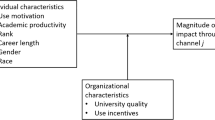Abstract
This article focuses on the extent to which styles of research could account for academic ideologies, concerning both faculty and student affairs, among academic researchers in sociology, psychology, political science, and education. The hypothesis maintains that researchers in all four fields who favor styles of research which compete successfully are likely to take a conservative attitude toward student and faculty affairs. In contrast, researchers who favor styles of research which compete less successfully are likely to take an attitude favoring changes. The results confirm the hypothesis mainly among faculty in psychology and very little among faculty in other fields. The data are based on a secondary analysis of data collected by Ladd and Lipset in their 1975 “Survey of the American Professoriate.”
Similar content being viewed by others
References
Ben-David, J. Scientific productivity and academic organization in nineteenth century medicine.American Sociological Review 1960,25 823–843.
Collins, R. Competition and social control in science: An essay in theory-construction.Sociology of Education 1968,41 123–140.
Habermas, J.Knowledge and human interests. Boston: Beacon Press, 1971.
Hagstrom, W. Departmental prestige and scientific productivity. Paper presented at the annual meeting of the American Sociological Association, Boston, 1965.
Kay, P. The myth of non-academic employment: Observations on the growth of an ideology.American Anthropological Association Newsletter, October 1977.
Kuhn, T. S.The structure of scientific revolution. Chicago: University of Chicago Press, 1962.
Ladd, E., and Lipset, S. The Ladd-Lipset survey.The Chronicle of Higher Education, March 29, 1976.
Lodahl, J. B., and Gordon, G. The structure of scientific fields and the functioning of university graduate departments.American Sociological Review 1972,37 57–72.
Mannheim, K.Ideology and Utopia. New York: Harvest Books, 1936.
Marx, K.Selected writings in sociology and social philosophy. New York: McGraw-Hill, 1956.
Marx, K., and Engels, F. Concerning the production of consciousness. In J. Curtis and J. Petras (Eds.),The sociology of knowledge. New York: Praeger, 1970.
Merton, R. K., and Zuckerman, H. Age, aging and age structure in science. InSociology of science. Chicago: University of Chicago Press, 1973.
Parsons, T. The institutionalization of scientific investigation. In B. Barber and W. Hirsch (Eds.),Sociology of science. New York: Free Press, 1962.
Phillips, D. L.Abandoning method. San Francisco: Jossey-Bass, 1973.
Schapiro, M.“Style” anthropology today: An encyclopedic inventory. Chicago: University of Chicago Press, 1953.
Stark, W.The sociology of knowledge. London: Routledge and Kegan, 1958.
Stinchcombe, A. L.Constructing social theories. New York: Harcourt, Brace and World, 1968.
Wilkes, J. Scientific styles and disciplinary emphases. Paper presented at Society for Social Study of Science, Harvard University, Boston, Massachusetts, October 14–15, 1977.
Author information
Authors and Affiliations
Rights and permissions
About this article
Cite this article
Haim, G. Academic ideologies and styles of research among academic researchers. Res High Educ 15, 291–304 (1981). https://doi.org/10.1007/BF00973510
Received:
Issue Date:
DOI: https://doi.org/10.1007/BF00973510




